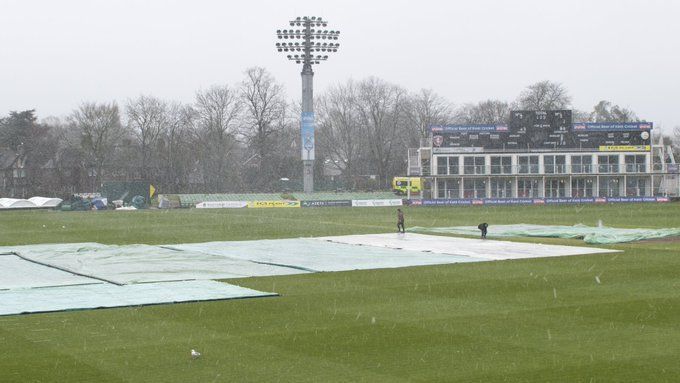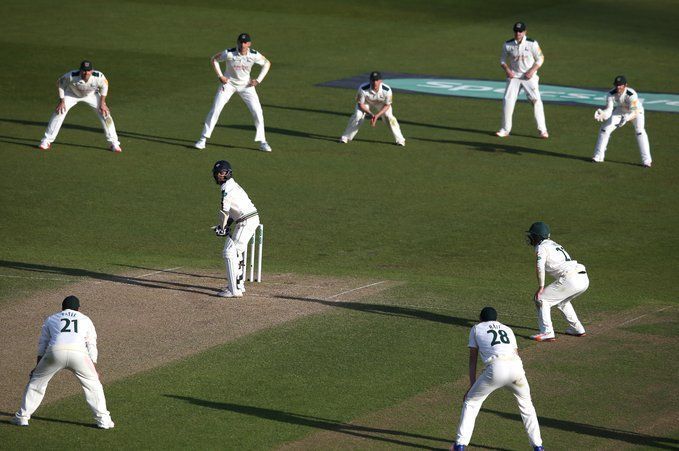
Burning questions for England: Is the County Championship fit for purpose?

With England's loss in the third and final Test against the West Indies - taking them to a 1-0 series defeat - comes the repeated questions over another failure:
- How can the side's young batters rectify their batting techniques?
- Will Joe Root remain as captain?
- Is the County Championship fit for purpose?
- Who will be the next coach?
- What to do next with Stuart Broad and James Anderson?
Their domestic first-class set-up does the national side no favors, and is arguably a factor in waning batting techniques at the Test level. Known as the County Championship, it has been marginalized to the bookends of the English summer, and begins next week.
Matches are often played in April, May and September when pitches are at their greenest and most treacherous.
Getting more first-class cricket matches at the heart of the summer is important to produce better pitches. It will give batters a helping hand in developing Test-match worthy techniques.
But the financial and commercial position of the English Cricket Board (ECB) doesn't permit a master solution.
The County Championship has always been a breeding ground for English batters, most notably by letting cricketers learn how to defend.
But batting techniques in the England Test side have become more and more scrutinized as they register a suite of batting collapses - most notably in their recent tours to the West Indies and Australia.
Concern over techniques begins with players not developing properly due to the emergence of white-ball cricket. The County Championship's important and historic apprenticeship is falling away as conditions get tougher and alternate opportunities with the white ball present themselves.
The Professional Cricketers' Association's director of cricket Daryl Mitchell admitted that certain players don't view the County Championship as worthy.
"I don't think we've got as many players who are prepared to bat for a day for a hundred and grind out an innings," he said speaking to Wisden Cricket Monthly. "The focus on T20 cricket has taken a little bit away from batting technique and mindset (to the longer formats of the game)."
He added that batting has become more difficult regardless.
"When I first started (playing) every opening bowler tried to swing the ball away and nick you off and you could leave probably the first 60, 70, 80 per cent of deliveries. Now bowlers bowl wobble-seam and down a fourth stump line and it makes life more difficult at the top of the order," he continued.
County Championship fixture balance: How many matches is enough?
The Wisden Cricket Weekly podcast previously flagged that across 18 counties there may be too many matches, and therefore batters' innings, to squeeze into a season.
The season is now played in two divisions, leaving each side with 14 matches to play - seven away and seven at home.
It is thought that fewer games would place more value on each innings for a batter, with fewer opportunities to impress for higher honors. Fewer fixtures would also result in added preparation time for each side ahead of each match.
In Australia's Sheffield Shield, all six state sides always have around a week between four-day matches, but they too face the same sechudling problems in the face of T20 and one-day cricket.
Other innovations such as implementing the use of the Kookaburra ball in England ahead of the Australian tour (as the Australians have done with a Duke ball in the Shield) may improve overseas fortunes.

But its a tough balance between the County Championship's objectives; produce English cricketers, ensure the survival of the game's longer formats, cater for 18 individual counties vying for trophies, and commercial and financial incentives for the ECB.
The ECB plans to host live streams of every match on its website and app, with daily highlights too.
"You've got to try and understand what the purpose of county cricket is, and producing cricketers for England is certainly one of those purpose, but you've also got 18 individual businesses that are trying to win trophies. And you've got broadcasters which ultimately finance pretty much everything in the game," Mitchell continued.
Coming out of the pandemic, the million-pound plus figure on each county's balance sheet has become vitally important in keeping the league alive at all.
England will host New Zealand next for a three-Test series in June, before a re-scheduled one-off Test match against India in July and a three-match series against South Africa in August-September.




